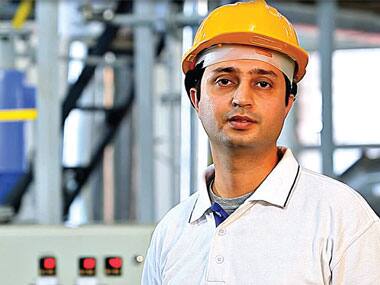Plastics are a necessary evil. Known for their utility and versatility, plastics are nonbiodegradable-hence a problematic pollutant. Though there are different techniques and technology to treat plastics and recycle them, none have proved to be commercially successful. That, however, can all change if Amit Tandon can prove and deploy his clean technology that looks to deliver oil from waste plastics.
Tandon, Founder and CEO, Ventana Cleantech, says that he has been intrigued by the promise and potential of the cleantech sector for over a decade and believes that such transformations can forge a ‘better world.’ “On train journeys from Chandigarh to Delhi, I observed how tens of thousands of plastic bags littered sewers, gutters, open ponds and slum dwellings close to the railway tracks,” says 37-year-old Tandon. “So, when I first came across the concept of converting waste plastics to fuels, I was greatly gripped by its potential for landfill diversion, ecological impact and recovery of energy.”
[caption id=“attachment_73782” align=“alignright” width=“380”]  Amit Tandon, founder and CEO, Ventana Cleantech. Image courtesy Entrepreneur.[/caption]
Best out of waste
Before starting Ventana, Tandon spent the larger part of 2006-09 studying and researching the underlying process to generate useful fuels from low-grade, non-recyclable waste plastics. A former employee of Sun Microsystems methodology development in the US, Tandon decided to base his R&D in Chandigarh but to locate his company in San Francisco’s Bay Area.
Currently the dominant method for recycling plastics involves converting them to reprocessed granules for re-use. However, such recycling is limited to plastic waste stream that has the same or compatible resins.
Most regions in the world have a 70-95 percent rate of recycling of metals, waste paper and cardboard. However, in the absence of a cost-effective technology that accepts mixed, contaminated, and low-grade plastics, the rate of plastic recycling in almost every region ismuch lesser. Since plastics are manufactured from crude oil derivatives, their landfilling represents a humongous waste of energy that when recovered could diminish the pace at which fossil fuels are being depleted globally.
Ventana’s technology transforms nonrecyclable, dirty, low-grade, mixed waste plastics into a useful resource, claims Tandon. “Globally, plastic-to-oil remains a nascent blue ocean segment with only a few credible players that bring an R&D centric approach to the problem. Most competing variants deploy capital intensive batch-based systems to convert waste plastics to a mix of synthetic crude oil, waxes and slurries which have limited offtake and low economic value,” says Tandon.
By enabling a fully continuous technology, Ventana has disruptively downshifted the capital cost of plant and machinery from a prior $10-$20 million for a 20 tpd (tonnes per day) plant to a price point that is a fraction of the same. As a result, Ventana’s technology generates distillate grade fuels at a cost that is significantly lower than the price of equivalent fuel from a traditional petroleum refinery, giving the technology feet to run and wings to fly without government subsidies or tax breaks, says Tandon.
Keeping it real
Tandon has not raised any institutional capital yet. Ventana’s R&D is supported by Milestone-a mechanical engineering and automotive component manufacturer.
Incepted in 2009, it established the first of its waste plastics to oils plants in late 2010. It has since completed three major development cycles and commissioned a third generation fully continuous pilot plant at its R&D centre in 2012.
[caption id=“attachment_73780” align=“alignleft” width=“620”]  Image courtesy Entrepreneur.[/caption]
The plant has been running successfully for over a year and its performance and yield has been independently evaluated by Mott MacDonald-a global leader in engineering design, says Tandon.
KD Fatnani, Business Development Director, Mott MacDonald, heard about Ventana a year ago when Tandon approached him for providing engineering services for a 15 tpd plant. “Ventanahas overcome a number of technical problems in the scaling up of the lab process as well as in selection and design of critical equipments,” says Fatnani.
Ventana’s technology, according to Tandon, generates 5.5-6 barrels of fuel per ton of waste plastics. He tells us that the generated fuel has been analyzed by leading petroleum labs and confirmed to be compliant with most ASTM parameters related to diesel and gasoline fuels. The company has also filed for several international patents related to the core aspects of
the technology.
Generating capital
The company is in its pre-revenue stage and Tandon says it will make money by designing, manufacturing, and selling systems to industrial waste-plastic recyclers and other waste management companies that aggregate waste plastics from municipal, industrial and commercialsources.
Other revenue streams for the company will come from retailing fuels from its self-owned plants. Tandon’s college classmate and co-founder of The Morpheus, Sameer Guglani says, “The solution to this problem will not come out of banning plastics or trying to reduce the usage,” he says.
“The solution will come from economically viable and sustainable methods to recycle plastics. That is exactly what Ventana is doing,” he adds. Guglani says that so far the company has done very well to grow organically but would be wary about how Tandon handles himself when the word gets out on his technology.
“To me, the pitfalls could come if they suddenly get too much attention and too much money,” Guglani says. “The money starts dictating terms-such situations have killed many worthy innovations.”
This story first appeared in Entrepreneur India magazine.


)
)
)
)
)
)
)
)
)



